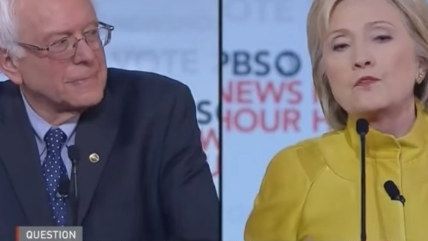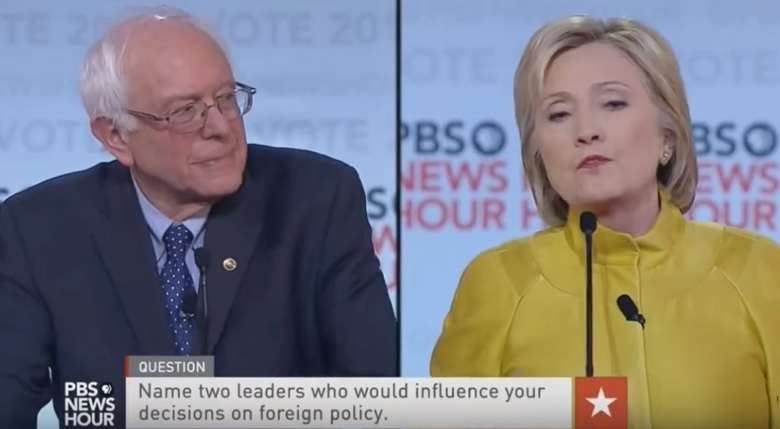Clinton vs. Sanders over Obama's Performance Is All About the Democratic Party's Future
A seemingly petty fight over criticism of the president highlights a party struggle for a new identity.


Toward the end of last night's Democratic debate we saw a lengthy back and forth as Hillary Clinton attacked Bernie Sanders for the crime of speaking ill of President Barack Obama. Part of it was strategic, obviously. Clinton has deliberately positioned herself as Obama's third term from the start of her "formal" campaign launch rally. Her message to Democratic voters has been, "If you like what Obama has done, you can expect the same from me." And as the primaries head toward South Carolina, she obviously has her eyes on where the minority vote may be going.
Here's a highlight of how harshly Clinton presents the idea that Sanders was expected to support the home team (despite, you know, Sanders serving the Senate as an independent, not a Democrat):
[T]oday Senator Sanders said that President Obama failed the presidential leadership test. And this is not the first time that he has criticized President Obama. In the past he has called him weak. He has called him a disappointment. …
And later:
And it is a — the kind of criticism that we've heard from Senator Sanders about our president I expect from Republicans. I do not expect from someone running for the Democratic nomination to succeed President Obama.
Sanders responded by calling the line of attack a "low blow" and said that he had the "right to disagree with the president, including a president who has done such an extraordinary job."
We will likely see more of this line of attack along with the critique that Sanders likely cannot put into place his radical economic and healthcare plans.
More fundamentally, this approach from Clinton is a reflection of how the Democratic Party is now struggling with an identity as Obama's presidency comes to an end. In a way, Obama truly has been the Democratic Party's Ronald Reagan. I don't mean the two men had a lot in common or that they were equally good (or bad) presidents.
Rather, the identity of the political parties revolved so heavily around the personalities and goals of their elected leader that it's no longer clear what the party actually is otherwise, beyond just a vague embrace of basic conservative or liberal politics, depending on which faction we're talking about. To criticize Obama is to criticize the Democratic Party and therefore Democratic voters. That was the not-subtle-at-all subtext of Clinton's attack.
The politically savvy Clinton is well aware she's stepping into a vacuum and her strategy is to ease nervous Democrats that everything will continue on as planned. But this growing Tea Party-ish (in style, definitely not in substance) fracture from the left was visible on the horizon from the 2012 midterms. While everybody had already taken note of the rise of Sen. Elizabeth Warren in Massachusetts, there were other "warning" signs that the Democratic Party was going to be struggling with its agenda post-Obama. I took note of this in a preview of the 2014 midterms:
Rifts have appeared on the Democratic side as well: progressives vs. centrists, anti-imperialists vs. interventionists, Sen. Elizabeth Warren (D-Mass.) vs. Hillary Clinton.
It's still too soon to know whether Warren will give Clinton a challenge from her left in 2016, though the Massachusetts senator is on the record saying she does not want to run. But there was a preview of what such a fight might look like in September, when New York Gov. Andrew Cuomo fended off a spirited campaign from the progressive academic Zephyr Teachout. Cuomo represented the centrist, pro-business Democrats (complete with accusations of corruption), while Teachout wanted to ban fracking, raise the minimum wage, and roll back business-friendly tax cuts. Cuomo won, but Teachout managed to grab 34 percent of the vote despite being vastly outspent and never having previously run for office.
Obviously we know now that Warren won't be challenging Clinton. But she also hasn't endorsed Clinton, either, and it's obvious Sanders is the proxy candidate for Democratic voters who have the same lefter-than-the-establishment views. Teachout, meanwhile, wrote a piece for The Huffington Post heaping praise on Sanders.
That fight at the end of the debate is a distillation of this Democratic Party identity crisis. Clinton's performance is an embrace of the personality-driven core of the party. Sanders' performance and calls for "revolution" are an open and obvious call for a shift to a party driven by an operational ideology, not a person.
When Sanders won the popular vote in New Hampshire's primary, he mentioned in his victory speech the canard that Democrats win when voter turnout is high and lose when voter turnout is low. The stated reason he brought this up was to discuss the size of the turnout for the primary. Republicans had their highest turnout ever for a primary; Democrats had their second-highest (2008 had the highest).
But consider the invocation of turnout a warning to the Democratic establishment—ignore the positions Sanders is taking at their peril. If Clinton gets the nomination and she can't get Sanders' supporters to the polls for her, she could lose by virtue of voter disenfranchisement and apathy. Republicans are facing the same issue, worrying what Donald Trump's voters might do if he's not nominated (although, in an interesting reversal, Trump represents the same personality-driven presidency Clinton is trying to capitalize on, while the other candidates are campaigning on an ideological view of what the Republican Party should stand for).
Ultimately, while that fight appeared rather petty and not terribly useful (especially to non-Democrats), it represents what is likely to be a big fracture in the Democratic Party's identity moving forward, especially if they lose the presidency in 2016 and we get a complete GOP takeover of the executive and legislative branches, a complete reversal of what happened in 2008. Look what happened to the Republican Party after that.
All of this should matter to independents because that puts the identity of the Democratic Party up for grabs. Libertarian and independent attitudes made inroads within the Republican Party as it struggled under Obama to recover a place in political power. The same push could be useful on the left.


Show Comments (51)